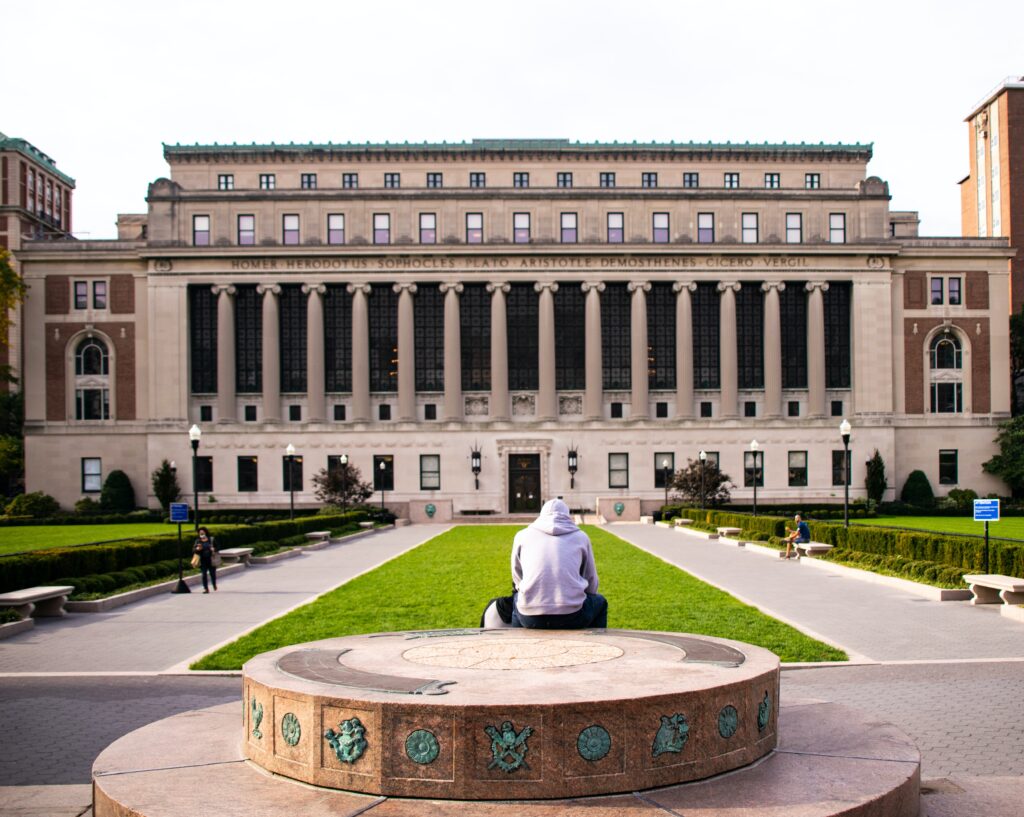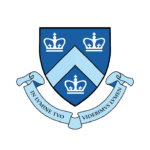
In this Columbia University Essay Guide, we will cover how to approach the 2020-2021 Columbia University supplementary essays. For more guidance on personal essays and the college application process in general, sign up for a monthly plan to work with an admissions coach 1-on-1.
If you have your sights set on Columbia University, you’re probably pretty confident in your SAT or ACT score and GPA. Okay, so the numbers check out — but getting into a school like Columbia is about way more than numbers. It’s about fit, voice, and personality. It’s about adding something to the student body other than just another perfect test score. I mean, yawn. Columbia isn’t your typical Ivy — it’s in the middle of New York, which means it has all the progressive buzz of a big city juxtaposed with the academic tradition of the Core Curriculum (more on that later). Anyway, it’s unique, and that’s why your application should be all about standing out, rather than fitting into some mythical Ivy League student mold. Read on to find out how to do just that by hacking the essay questions.
The Columbia Voice
Let’s talk style before we delve into substance. Of course, the most important stylistic voice on your application is your own — and this section isn’t going to tell you to change it to appear to be some elusive, perfect Columbia applicant. Instead, let’s talk about how you can amplify certain aspects of your personality on the page to appeal to those all-powerful admissions officers. Guess what, they’re people, too — that’s why you should treat the written part of your application like a conversation. It’s your only chance to actually talk to them. So, talk!
Stay away from textbook language and relax a little, rhetorically speaking. You should be able to read your responses aloud but sound less like you’re reading an application, and more like you’re reading the transcript from an interview. That said, mind your grammar and spelling (this is Columbia University, after all). But stay far, far, away from the thesaurus. You already aced the vocab section of the SAT, no need to make things all daedalean and discursive.
The Columbia Voice, however, is more than just conversational. It’s clever. It’s confident in its own intellectual curiosity, unafraid to pose questions when others may feel intimidated. Express that curiosity in your essays, and make sure to talk more about your desire to learn, rather than your academic accomplishments. Remember, you’ll be speaking up a lot in seminar. So start now.
The Questions
For the four list questions that follow, we ask that you list each individual response using commas or semicolons; the items do not have to be numbered or in any specific order. No narrative or explanatory text is needed. It is not necessary to italicize or underline titles of books or other publications. Author names may be included, but are not required. You do not need to fill the entire space or use the maximum number of words; there is no minimum word count in this section, so please respond to the extent that you feel is appropriate.
Please list the following (150 words or fewer for each question): the titles of the required readings from courses during the school year or summer that you enjoyed most in the past year; the titles of books read for pleasure that you enjoyed most in the past year; the titles of print or electronic publications you read regularly; and the titles of the films, concerts, shows, exhibits, lectures and other entertainments you enjoyed most in the past year.
This question throws a lot of applicants off at first — is it some kind of test? are they checking to see if we find literary analysis just so irresistible that we can’t help but write five paragraph essay about the symbolism of so-and-so’s something-or-other in chapter eight?
Don’t overthink it. As a Columbia applicant — and I’m just taking a wild guess over here — you might be a little bit of an overachiever. However, this is not the time to list every book you’ve ever read. Pick your favorites: the ones you truly enjoy, the ones that have stuck with you over the years.
Imagine you’re recommending a book, a show, a magazine, etc. to your best friend. Let your authentic personality shine by being totally honest — yeah, you might read The Wall Street Journal every morning, but maybe you’re far more captivated by Food Network Magazine or Vogue. Or, maybe you read both. Don’t leave out publications, books, or shows that you genuinely enjoy just because you don’t think they’re “academic” or fit some Ivy League stereotype. Ivy Leaguers read Cosmo, too.
That said, you might want to stay away from adding anything along the lines of 50 Shades or Twilight. Then again, Columbia is known for being the progressive, edgier older sister in the Ivy family, so it’s really up to you in how much of a risk you want to take. Does including less-conventional titles add to the story your application is telling as a whole? Does it actually make sense? If so, go for it. But don’t do something just for shock factor, because the admissions officers will see right through that. Remember — be genuine.
Columbia students take an active role in improving their community, whether in their residence hall, classes or throughout New York City. Their actions, small or large, work to positively impact the lives of others. Share one contribution that you have made to your family, school, friend group or another community that surrounds you. (200 words or fewer)
Think about the different communities that exist within your life. Are you a member of your school’s marching band? Do you pick up your little sibling from soccer practice after school every day and cook her dinner while your parent is busy at work? Do you volunteer at your city’s polling sites each year?
As you can see from the question, there’s a really wide range of things that can be considered to be a community. In this essay, show not only how you’ve contributed to a community, but also convey why community is important to you. The Columbia admissions officers are looking for students that will positively impact their community — they want to see what motivates you and what you’ve done, so they can get a better idea of what you might contribute to Columbia.
In this essay, try to write about a part of your life that isn’t already represented elsewhere in your application. Brainstorming can go two ways: 1) you could start by deciding on a community to write about, then discuss how you’ve influenced that community, or 2) start by thinking about the various impacts and changes that you have made in general, and then choose the community based on whichever impact feels the most important to you.
Why are you interested in attending Columbia University? (200 words or fewer)
Here’s where you write an ode to the Core Curriculum. Seriously. Find a certain course or aspect of the Core that truly resonates with you and focus on that, connecting it to the role you see yourself playing within the Columbia community as a whole. You can mention clubs you see yourself joining, organizations you see yourself volunteering for, even spots on or near campus in which you can see yourself studying (visiting campus definitely makes that last one a bit easier, but you can spend a few minutes on google maps street view to get inspired).
You should also definitely mention New York City, and the many opportunities this provides for Columbia students, but be careful with this one. Again, you don’t want to accidentally write a “Why I Want to Go to College in New York City” essay if it’s Columbia that you want in particular. When you talk about the city, be specific, and continue to tie in the core — like how Music Humanities includes a trip to the Met Opera, Art Humanities takes you to The Met multiple times, and Frontiers of Science will have you explore the American Museum of Natural History.
Don’t forget to say how you value having a traditional campus as well, and how special it is to have this oasis within the big city. Talk about what you will bring to campus, and what you will add to the core. Do you have a unique perspective on a certain text that you can’t wait to discuss in Literature Humanities ? Which text? What would you say? Or maybe it’s a certain painting in Art Humanities, or a sonata in Music Humanities. Whichever class you choose to focus on, establish what you bring to the table — and make it something unique; you don’t want to seem replaceable. Remind them not only why you need Columbia, but why Columbia needs you.
If you are applying to Columbia College, tell us what from your current and past experiences (either academic or personal) attracts you specifically to the field or fields of study that you noted in the Member Questions section. If you are currently undecided, please write about any field or fields in which you may have an interest at this time.
If you are applying to The Fu Foundation School of Engineering and Applied Science, please tell us what from your current and past experiences (either academic or personal) attracts you specifically to the field or fields of study that you noted in the Member Questions section.
Think of this response as a mini personal statement — your common app essay, but make it Columbia. You’ll want to tie in your application’s narrative to Columbia itself. However, be wary of repeating yourself — you want to ADD to the personal narrative you’ve crafted so far, not rehash the same things over and over again.
Imagine you’re writing a paper: although you state your thesis in the introductory paragraph, you don’t just repeat it throughout the paper — it evolves and deepens as the paper progresses, just as your story should develop throughout your application. This is your concluding paragraph. It’s substantial, detailed, and confident.
So, how do you do this? First, start off strong with a statement about what makes you unique, leading into a brief anecdote.
Mine was, “I’m a creative learner.” Then, I talked about how I took notes in class in high school by drawing comic strips in my notebook instead of boring old bullet points. Then, I went into talking about my choice courses of study — Creative Writing and Art History. You can use this “anecdote-to-major” formula for writing about pretty much any course of study — even you, engineering majors, can dig deep and embrace your inner creative writer (I promise you won’t have to do it again once you get into SEAS).
After you’ve tackled the “experiences” part of the question, it’s time to get really specific. Spend some time with the online directory of classes and research specific classes you’re interested in taking. Now is the time to mention professors, theories, books — connecting it to your own personal philosophy and unique perspective, of course.
This Columbia University essay guide was written by Gabriela Vascimini, Columbia University ‘21. If you want to get help writing your Columbia application essays from Gabriela or other CollegeAdvisor.com Admissions Experts, register with CollegeAdvisor.com today.

